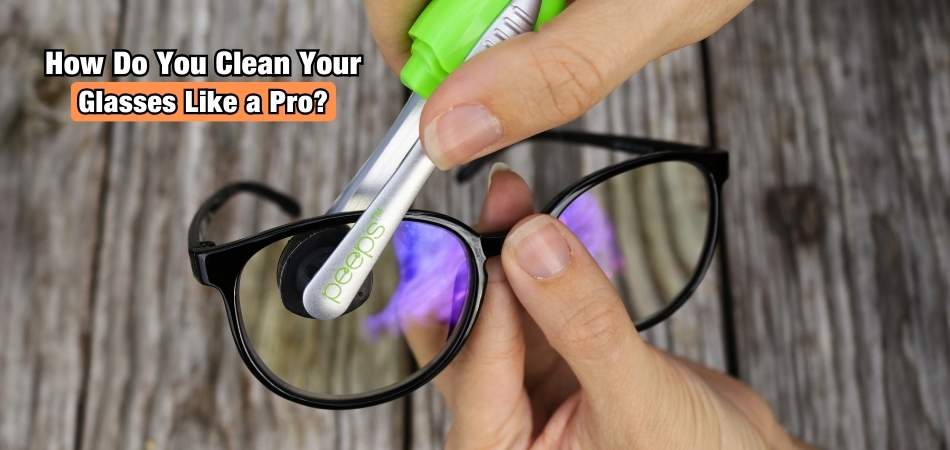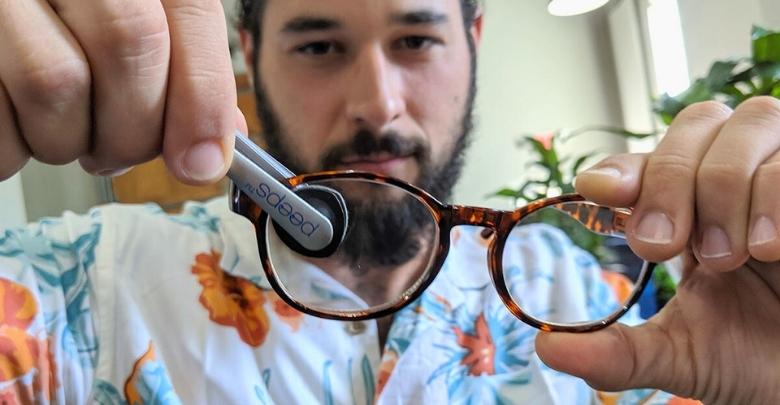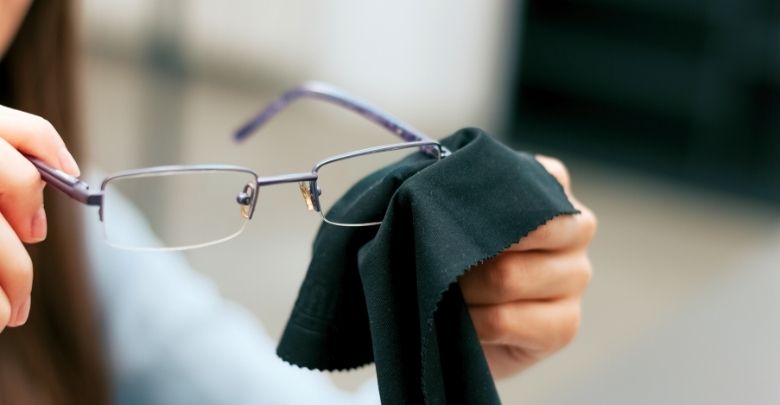Cleaning your glasses every day is more than just wiping off the day’s dust and debris. The importance of this task goes beyond mere cleanliness; it impacts how effectively you interact with the world around you. If you’ve ever had that question: How do you clean your glasses like a pro? It’s not just you who wants streak-free clarity.
Proper cleaning involves more than just a quick rub with a cloth; it requires careful attention to materials and techniques to prevent damage and ensure your glasses are clear. Using the right tools—a microfiber cloth, an appropriate cleaning solution, and gentle handling—are key steps to effective cleaning.
Are you curious to learn more about achieving professional-level cleanliness for your glasses? Continue reading this guide, where you’ll discover detailed, easy-to-follow steps and tips. Here, every piece of information you need to maintain optimal lens clarity and keep your frames in pristine condition is at your fingertips.
Why Proper Glass Cleaning Matters?
Proper cleaning of glasses is essential not only for clear vision, but also to maintain the longevity and effectiveness of your lenses. Over time, dirt, dust, and fingerprints can accumulate, leading to smudges that obscure vision and can cause eye strain. Regular and correct cleaning ensures that your glasses perform at their best, providing you with unobstructed and clear eyesight.
Moreover, incorrect cleaning techniques or materials can damage the lenses. Scratches, abrasions, or even worse, permanent damage to anti-reflective coatings can occur if glasses are not cleaned properly. These issues can compromise the visual clarity of your glasses and ultimately require costly replacements.
A particularly effective solution for ensuring thorough cleanliness without risking damage is Peeps by Carbon Klean. This tool is designed to gently yet effectively remove debris and oils without leaving scratches or residues, making it an ideal choice for maintaining the integrity of your lenses. Peeps by Carbon Klean uses a carbon cleaning compound that attracts oils and dirt, ensuring that every clean is as good as professional lens care.
How Do You Clean Your Glasses Like a Pro?
Cleaning your glasses properly is crucial not only for ensuring optimal vision but also for extending the lifespan of your eyewear. Whether you wear prescription glasses or sunglasses, following a professional cleaning routine can prevent damage and maintain clarity. Here’s how you can achieve a pro-level clean at home, keeping your lenses spotless and scratch-free.

Gather the Right Materials
Choosing the right cleaning tools is the first step. A microfiber cloth is essential, as it is gentle on lenses and effectively removes fingerprints, oil, and dust without scratching. Avoid using paper towels, tissues, or clothing, as these can grind dust and fibers into the lenses and cause damage. Always use a cleaner specifically designed for eyeglasses or a mild dish soap diluted with water to ensure safety and effectiveness.
Wash and Dry Thoroughly
Hold your glasses under lukewarm water to rinse away any loose particles; this will prevent them from scratching the lens when you wipe. Apply a small amount of your chosen glasses cleaner to each lens, gently rub it across the surface in a circular motion with your fingers, and then rinse thoroughly. Once all soap has been washed off, shake off the excess water and carefully dry the lenses and frame with a clean microfiber cloth, ensuring all moisture is removed.
Clean the Entire Frame
You should clean the entire frame, not just the lenses. Pay particular attention to the nose pads and the ends of the temples that tuck behind your ears, as these areas accumulate oils and debris. Use a soft toothbrush or another soft-bristled brush to gently scrub these hard-to-reach areas. If you use soap on the frame, make sure to rinse it thoroughly to prevent any irritation to your skin when you wear the glasses.
Inspect and Repeat as Needed
After cleaning, inspect your glasses in good light to ensure there are no smudges or streaks left behind. If streaks are present, lightly re-wet the lens with cleaner and dry again with a microfiber cloth. Regular cleaning is recommended not just when your vision is obstructed; a daily wipe-down at the end of the day maintains the cleanliness and longevity of your lenses.
Use Proper Storage Techniques
To protect your glasses when not in use, always store them in a sturdy case. This prevents dust accumulation and reduces the risk of accidental scratches, bends, or breaks. You should avoid leaving your glasses in environments where they may be exposed to excessive heat or cold, which can damage the lens coatings or frame materials.
Follow these steps to ensure that your glasses are always clean and clear, just like a professional would do. Proper maintenance not only helps you see better but also makes your glasses last longer, saving you time and money on replacements.
What Materials Do You Need to Clean Your Glasses Like a Pro?
Your eyeglasses will last longer if you keep them clean in addition to improving your vision. Using the right materials is essential for achieving a professional-level clean without causing any damage. Here’s a guide to the essential cleaning tools every glasses wearer should have.

Microfiber Cloths
The backbone of proper glasses cleaning is a high-quality microfiber cloth. These cloths attract dust and oil, lifting them off the lens rather than smearing them around. Unlike paper towels or other fabrics, microfiber cloths prevent scratches while effectively cleaning the surface. It’s a good idea to have several on hand so you can use fresh cloths regularly.
Proper Cleaning Solutions
For optimal lens cleanliness, use a cleaning solution specifically formulated for eyeglasses. These solutions are designed to break down oils and residues without damaging the lens coatings. Avoid using household glass or surface cleaners, as they may contain chemicals that can strip the coatings of your lenses. Ensure you’re aware of the different types of eyeglass cleaners to ensure you’re using a product that is safe and effective for your specific type of lenses.
Gentle Soap
If you don’t have access to a specialized lens cleaner, a small amount of gentle, lotion-free dish soap can also do the trick. Mix the soap with water to create a mild cleaning solution that can safely cleanse your glasses. Apply the soapy water with your fingers, gently rubbing the lenses, and rinse thoroughly to avoid leaving any soap residue, which can cause streaks.
Air Blower or Dust Brush
Before wiping your glasses, it’s advisable to remove any particles that could scratch the lenses. A small air blower or a soft-bristled dust brush can effectively remove debris from the lenses and frame. This step is particularly important, as rubbing dust or grit directly on the lenses can lead to scratches that permanently damage your glasses.
Storage Case and Repair Kit
Lastly, proper storage is key to keeping your glasses clean and safe when not in use. A sturdy, protective case prevents dirt buildup and protects your glasses from physical damage. Having a small repair kit on hand for tightening screws or adjusting the fit can help maintain the structural integrity of your frames, keeping them in optimal condition.
How Often Should You Clean Your Glasses?
Keeping your glasses clean is crucial for ensuring optimal vision and maintaining the integrity of your lenses. The frequency of cleaning can vary depending on your lifestyle, environment, and how often you use your glasses. Here’s a simple guide to help you determine how often you should clean your glasses to keep them in top condition.
Daily Light Cleaning
For most glasses wearers, a daily light cleaning is recommended to remove everyday smudges and dirt. Using a microfiber cloth, gently wipe the lenses in a circular motion to avoid scratching. This simple routine can be done at the end of each day and helps prevent the buildup of oils and dirt that can obscure your vision. Regular light cleanings ensure that your glasses are always ready to wear and provide clear vision.
Weekly Thorough Cleaning
In addition to daily light cleanings, a more thorough cleaning once a week is beneficial. This involves using a lens cleaning solution or a small amount of gentle dish soap diluted with water to carefully clean the lenses, frame, and especially the nose pads and temple tips where oils tend to accumulate. Rinse your glasses under lukewarm water and dry them with a clean microfiber cloth.
Immediate Cleaning After Exposure
If your glasses are exposed to environments that can dirty or fog them up quickly, such as kitchens, laboratories, or dusty outdoor areas, clean them immediately after exposure. Removing contaminants before they can settle on the lens surface prevents scratches and other damages. For those who use glasses in challenging environments, carrying a portable cleaning kit can be particularly useful for immediate maintenance.
Professional Cleaning
Even with regular home cleaning, consider a professional cleaning every few months, especially if your glasses have anti-reflective or other special coatings. Many optical shops offer professional cleaning services that can help restore your glasses to a nearly new condition. They use ultrasonic cleaners that can remove debris from hard-to-reach areas of the frame and lenses, ensuring a deep clean that might be difficult to achieve at home.
Common Mistakes to Avoid When Cleaning Your Glasses
Properly cleaning your glasses is crucial to maintain both their effectiveness and longevity. However, certain common mistakes can cause more harm than good. To ensure your glasses stay in pristine condition, here are some key errors to avoid during the cleaning process.

Using Inappropriate Cleaning Materials
One of the most common mistakes is using paper towels, tissues, or clothing to clean glasses. These materials can be too abrasive and scratch the lens surface. Using products not specifically designed for glasses, such as window or kitchen cleaners, can damage lens coatings. Always opt for a microfiber cloth and lens-specific cleaner to safely clean your glasses.
Applying Rubbing Alcohol Directly on Lenses
When cleaning glasses, you should use products that are safe for your lenses. While alcohol-based solutions can be useful, rubbing alcohol for glasses should be used cautiously to avoid damaging anti-reflective or specialty coatings. Opt for cleaners specifically designed for eyewear to ensure effective cleaning without compromising the integrity of your lenses. This method helps maintain the clarity and durability of your glasses.
Skipping the Rinsing Step
Neglecting to rinse glasses with water before wiping them down can lead to scratches. Dust and other fine particles that accumulate on the lens can act like sandpaper when wiped dry. Always rinse your glasses under a gentle stream of lukewarm water to remove these particles before applying any cleaning solution.
Handling Lenses Improperly
Many people inadvertently apply too much pressure on the lenses while cleaning them, which can lead to warping or breakage. Hold your frames by the bridge, not the lenses, to avoid fingerprints and unnecessary pressure. Ensure you clean the lenses gently in a circular motion to avoid damage.
Common Questions and Answers
If you’re aiming for pro-level cleanliness, you might still have questions about the best practices. Below are some FAQs that dive deeper into the nuances of cleaning glasses professionally, providing you with additional insights to ensure your eyewear is always in pristine condition.
How Do I Safely Remove Stubborn Residue from My Glasses?
For stubborn residue, such as oil or dried water spots, pre-treat the lenses with a few drops of lens cleaning solution or a diluted dish soap mixture. Let it sit for a minute, then gently wipe away with a clean microfiber cloth using circular motions. This softens and dissolves residue for easier removal.
What Should I Do if My Glasses Get Greasy?
If your glasses are particularly greasy, use a lens cleaning spray designed to cut through grease or a drop of dishwashing liquid mixed with plenty of water. Apply gently with your fingers, rinse thoroughly, and dry with a microfiber cloth to avoid streaks and leftover residue.
Is There a Safe Way to Disinfect My Glasses?
To safely disinfect your glasses, you can use a solution made for eyewear that includes isopropyl alcohol, but avoid direct application of household rubbing alcohol, especially on coated lenses. Spray the disinfectant on a microfiber cloth first, then wipe the glasses to eliminate germs without damaging the lenses.
Can I Use Ultrasonic Cleaners for My Eyeglasses?
Ultrasonic cleaners are safe for eyeglasses, especially if you want a deep clean without much effort. Ensure the device is suitable for optical wear and follow the manufacturer’s instructions carefully to avoid any potential damage to your glasses.
How Should I Handle Wet Glasses?
When your glasses are wet, do not rub them dry; this can grind in any dust or particles and cause scratches. Instead, gently shake off the excess water and carefully dab the lenses with a soft, dry microfiber cloth until they are dry and clear.
Final Thought
If you know how to effectively clean your glasses, you’ll provide the best possible care for your eyeglasses. By adopting the techniques described, you now know how do you clean your glasses like a pro? A skill that will serve you daily.
As you apply these methods, remember always to use gentle, precise movements and to choose the right materials for cleaning. Best wishes as you put these professional tips into practice, ensuring your glasses are impeccably clean and your vision is as sharp as it can be!






